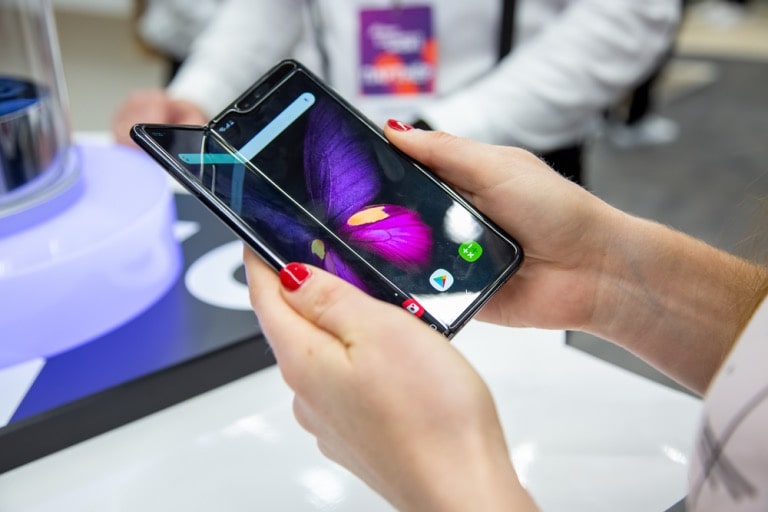Flip phones, also known as clamshell phones, have been a unique product in the mobile device industry for decades. These compact and portable devices have captured the hearts of many users with their iconic design and distinctive features.
From the early days of the clamshell form to the modern era of foldable smartphones, the evolution of flip phone designs has been a fascinating process.
The Rise of Clamshell Flip Phones
At the moment, having a flip phone is considered respectable. Many young adults order dissertation writing services to secure their graduation, look into future job prospects, and buy flip phones to appear successful in advance.
But just a few years ago, the mere idea of a flip phone would have been considered outdated. So what happened?
Let’s start from the beginning. In the 1990s and early 2000s, clamshell flip phones dominated the market.
These devices were characterized by a hinged design that allowed the phone to fold in half, protecting the screen and keypad when not in use. The clamshell design offered several benefits, including:
- Compact and portable form factor
- Protection for the screen and keypad
- Unique and stylish appearance
- Satisfying “snap” when opening and closing the device
Clamshell flip phones were popular among users who valued portability, durability, and a tactile user experience.
Features and Design of Clamshell Flip Phones
Clamshell flip phones often featured a range of innovative features, including:
- External Display: Many models included a small external display that showed the time, caller ID, and other essential information without having to open the device.
- Keypad and Navigation: The internal keypad and navigation buttons provided a tactile and responsive user experience, making it easy to make calls, send text messages, and navigate through the phone’s features.
- Camera: Some clamshell flip phones were equipped with basic camera functionality, allowing users to capture photos and videos.
- Multimedia Capabilities: As technology advanced, clamshell flip phones began to incorporate features like music playback, FM radio, and even basic internet connectivity.
Advancements in Flip Phone Technology
Over time, flip phone technology continued to evolve, with manufacturers introducing various advancements:
- Improved display quality and resolution
- Enhanced camera capabilities
- Increased processing power and memory
- Incorporation of touchscreen functionality
- Incorporation of slide-out QWERTY keyboards
- Integration of smartphone-like features and apps
These advancements helped extend the lifespan of flip phones and made them more versatile and user-friendly.
The Decline of Flip Phones and the Rise of Smartphones
As smartphones with large touchscreens and advanced capabilities became increasingly popular in the late 2000s and early 2010s, the demand for traditional flip phones began to wane.
Consumers were drawn to the expansive features and intuitive interfaces of smartphones, which offered a more comprehensive and immersive mobile experience.
The Return of Flip Phones with Modern Features
In recent years, there has been a resurgence of interest in flip phone designs, with manufacturers introducing new models that blend the classic clamshell form factor with modern features and capabilities. These “smart flip phones” often include:
- Foldable or flexible displays
- Powerful processors and increased memory
- Advanced camera systems
- Integrated smartphone-like features and apps
- Enhanced connectivity options, such as 5G support
Manufacturers keep experimenting with different hinge mechanisms, display technologies, and form factors. Some of the key developments include:
- Inward-folding designs (e.g., Samsung Galaxy Fold)
- Outward-folding designs (e.g., Huawei Mate X)
- Clamshell-style foldable designs (e.g., Samsung Galaxy Z Flip)
- Tri-fold designs with multiple hinges
- Rollable displays that can extend the screen size
As the technology matures, foldable phones are becoming more durable, feature-rich, and affordable, paving the way for wider adoption.
Benefits and Drawbacks of Foldable Phones
Foldable phones offer several potential benefits, such as:
- Compact and portable form factor when folded
- Larger, more immersive display when unfolded
- Unique user experiences and form factors
- Increased screen real estate for productivity and entertainment
However, they also come with some drawbacks, including:
- Higher prices compared to traditional smartphones
- Potential durability concerns with the folding mechanism
- Limited availability and selection of compatible apps and accessories
Comparison of Popular Foldable Phone Models
Here’s a comparison of some of the most popular foldable phone models currently available:
| Model | Display Size (Unfolded) | Display Size (Folded) | Hinge Design | Key Features |
| Samsung Galaxy Z Fold3 | 7.6 inches | 6.2 inches | Inward-folding | S Pen support, Water resistance, 5G connectivity |
| Motorola Razr 5G | 6.2 inches | 2.7 inches | Clamshell-style | Nostalgic design, Quick View external display |
| Oppo Find N | 7.1 inches | 5.5 inches | Inward-folding | Compact form factor, Flexible display, Improved durability |
| Microsoft Surface Duo 2 | 8.3 inches | 5.8 inches | Dual-screen | Productivity-focused, Multitasking capabilities |
The Future of Flip Phone Designs
The future of flip phone designs looks promising. Manufacturers are likely to continue exploring new form factors, display technologies, and innovative features to cater to the diverse preferences of consumers.
Some potential developments in the future of flip phone designs include:
- Further advancements in foldable display technology for improved durability and reliability
- Integration of advanced camera systems and computational photography capabilities
- Expansion of the app ecosystem and software optimization for foldable devices
- Exploration of new form factors, such as tri-fold or rollable designs
- Increased affordability and accessibility of foldable phones for a wider audience
It’s an exciting time to explore the latest advancements in flip phone and foldable phone designs. To stay up-to-date on the latest innovations, be sure to follow the trends and consider getting one of such phones for yourself if you like their design and features.
